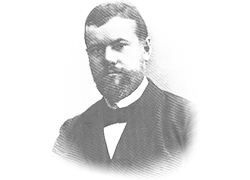David Strang’s research focuses on innovation and diffusion in the political, organizational, and scientific worlds. Recent projects include study of the evolution of the research article over time, the impact of social movements on Congressional voting, and computational models of the adoption and abandonment of management practices. Ongoing work examines obituaries appearing in the New York Times as a way of understanding what sorts of achievements are publicly celebrated.
Expertise
Current Research Interests
Diffusion of management practices within the American business community, with a focus on “quality” programs that combine quality control techniques and participative management; managerial rhetorics (the way consultants, managers, and academics argue for or against “innovations”); the appearance of consulting communities and the way consultants move across innovations (e.g., from quality circles to TQM); innovation decisions taken by a global financial services corporation in a variety of areas including quality, work-life balance, and the Internet
Selected Publications & Presentations
- (With Michael W. Macy) “Pluralistic Ignorance and the Top Secret Management Handbook: A Computational Model of Fashionable Innovation.” In A. Lomi and E. Larsen, eds. Simulating Organizational Societies: Theories, Models and Ideas. Cambridge, MA: MIT Press, 2001.
- (With Sarah A. Soule) “Diffusion in Organizations and Social Movements: From Hybrid Corn to Poison Pills.” Annual Review of Sociology 24, 1998. Pp. 265-90.
- (With Victor Nee) “The Emergence and Diffusion of Institutional Forms.” Journal of Institutional and Theoretical Economics 154, 1998. Pp. 706-15.
- “Contested Sovereignty: The Construction of Colonial Imperialism.” In C. Weber and T. Biersteker, eds. State Sovereignty as Social Construct. Cambridge: Cambridge University Press, 1996. Pp. 22-49.
- (With Henrich R. Greve and Nancy B. Tuma) “Specification and Estimation of Heterogeneous Diffusion Processes.” In P. V. Marsden, ed. Sociological Methodology. Oxford: Blackwell, 1995. Pp. 377-420.
- “Health Maintenance Organizations.” In G. R. Carroll and M. T. Hannan, eds. Organizations in Industry: Strategy, Structure, and Selection. Oxford: Oxford University Press, 1995. Pp. 163-82.
- “The New Institutionalism as a Form of Structural Analysis.” In C. Prendergast and J. D. Knottnerus, eds. Recent Developments in the Theory of Social Structure. Greenwich, CT: JAI Press, 1994. Pp. 151-74.
- “British and French Political Institutions and the Patterning of Decolonization.” In T. Janoski and A. Hicks, eds. The Comparative Political Economy of the Welfare State: New Methodologies and Approaches. Cambridge: Cambridge University Press, 1994. Pp. 278-95.
- (With Nancy B. Tuma) “Spatial and Temporal Heterogeneity in Diffusion.” American Journal of Sociology 99, 1993. Pp. 614-39.
- (With John W. Meyer) “Institutional Conditions for Diffusion.” Theory and Society 22, 1993. Pp. 487-511.

